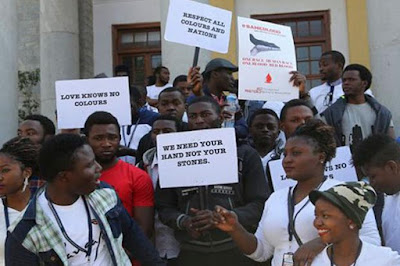RACISM AS PART OF CULTURE IN INDIA
There is ample
evidence historical and contemporary to say, without ambiguity, that large
swathes of the Indian population are essentially racist. Even as we habitually
mouth tributes to our own capacity for apparent 'tolerance,' we stoke the
flames of hatred and intolerance on a daily basis. Our multi-layered prejudices
reveal themselves not just in our shoddy treatment of minorities, women and the
LGBT community, but also in our fearless championing of one of society's
foundational prejudices - discrimination based on the colour of one's skin.
People
from various African nationalities who have lived in India, particularly in the
National Capital, have experienced the full brunt of India's deep-seated racist
mindset from time to time. Last month, Masonda Ketanda Olivier, a Congolese
national, was lynched to death by a mob in New Delhi. The police said the
violence was triggered by a row over hiring an autorickshaw. However, Olivier's
friend, a national of Ivory Coast, clearly identified the incident as a hate
crime. The attackers, according to his friend, used racial slurs to abuse
Olivier.
By
no means was the attack on Olivier an aberration that can be shrugged off as an
act of erratic lumpenism. Targeting individuals from Africa has become almost
habitual for Indians. Delhi, despite claims to cosmopolitanism, is a brutal,
racist place where the population of an entire continent has casually been
branded drug peddlers.
Two months ago, on
the eve of Holi, a gang of 12 men violently attacked two Nigerian nationals,
including a football coach, with cricket and baseball bats. The apparent
provocation was that one of the Nigerians allegedly scolded a child for hurling
a water-filled balloon at him in a West Delhi locality. A full 24-hours passed
before the police registered a case. In February, a Tanzanian woman was
stripped and thrashed by an irate mob in Bangalore, because of an entirely
different incident, where a Sudanese man reportedly hit a local with his car.
Ask
a citizen of any African nation living in Delhi about her day-to-day
experiences in public spaces and you are likely to hear a shameful narrative of
how people openly mock and sneer at them - besides of course subjecting them to
the customary long and hard stares. If black men and women are spared direct
violence, then it is the trauma of being made to feel unwelcome that they have
to contend with every day.
This
prejudice against African people is of course, an extension of Indians' natural
deference towards white skin. In our cultural practices, we privilege dangerous
combinations of colour and gendered discrimination. While patriarchy makes it
somewhat easier for dark skinned men to get by, dark skinned girls and women
face discrimination at every level of society. Consider for instance matrimonial
advertisements openly stating their preference for fair skinned brides, or
Bollywood films where light skinned women are always foregrounded. Even in
everyday, unglamorous jobs, all things equal, dark-skinned applicants -
particularly women - are often passed over for those with a fair complexion.
Our advertisement and cosmetic industry has vigorously
promoted this racist bias. According to a report by Ranjavati Banerji in New
Statesman this January, "The Indian fairness cream industry is worth
around $450m. Fair & Lovely, marketed by the consumer goods behemoth
Hindustan Unilever, has more than a 50 per cent share of the market."
Despite the growing criticism of such blatant racism and interventions by
celebrities to end the culture, the sale of skin whitening creams shows no
signs of abatement.
So, where do Indians get their racism from? In answering
this question, we frequently cite India's colonial history and the
well-entrenched caste system that predated it. In fact, many point to Mahatma
Gandhi's racist beliefs when he lived in South Africa between 1893 and 1914.
South African scholars Ashwin Desai and Goolam Vahed, in their book The South
African Gandhi: Stretcher-Bearer of the Empire, drew attention to Gandhi's
indifference to the condition of the indentured in South Africa at the turn of
the 20th century. Gandhi believed that whites should remain in power even as he
described the black African by the derogatory label of Kaffirs.
The history of caste is deeply implicated with racism too,
as many have pointed out. Most marriages still occur within caste groups and
upper and lower castes are still usually segregated in the Indian mind on the
basis of fairer and darker colours respectively. As the case of caste also
adequately points out, we cannot get away by blaming everything on the British.
As far back as in ancient India, terms like mleccha (barbarian) carried all kinds of discriminatory
connotations - often racist.
In the face of this long racist history, pleading for
introspection seems fruitless. On the other hand, realising how deeply racism
is embedded in our collective culture, does provide some clues to why some
chest-beating Indians - who often sign praises of our 'tolerance' - have taken
to worshipping at the altar of Donald Trump.








0 comments:
Post a Comment